#Role of religion in government
Explore tagged Tumblr posts
Text
Opinion | Lessons from Alexandria: A Cautionary Tale for Modern American Politics
By Jet Espinosa In a city once hailed as a beacon of knowledge and tolerance, Alexandria drew people from across the ancient world. It was a place where scholars, thinkers, and believers from diverse backgrounds came to share and preserve their wisdom. With libraries that housed invaluable knowledge in science, philosophy, medicine, and the arts, Alexandria was a symbol of progress and…

View On WordPress
#Alexandria library destruction#American democracy#Ancient Alexandria#Cultural diversity#Enlightenment and progress#Freedom of belief#Historical cautionary tales#History repeating itself#Intellectual freedom#Knowledge and tolerance#Lessons from ancient civilizations#Lessons from history#Modern American politics#Political power and religion#Politics and religion#Protecting democracy#Religious influence in politics#Religious tolerance#Role of religion in government#Separation of church and state
0 notes
Text

For a construction administration role….
#For a construction administration role….#construction#administration#employment#employees#employers#christofascism#christofascists#dogma#religion#slavery#wage slavery#slave wages#slaves#slave#ausgov#politas#auspol#tasgov#taspol#australia#fuck neoliberals#neoliberal capitalism#anthony albanese#albanese government#anti religion#fuck religion#job applications#jobsearch#jobseekers
0 notes
Text
Worldbuilding: Questions to Consider
Government & authority:
Types of government: What type of government exists (monarchy, democracy, theocracy, etc.)? Is it centralised or decentralised?
Leadership: Who holds power and how is it acquired (inheritance, election, divine right, conquest)?
Law enforcement: Who enforces the laws (military, police, magical entities)?
Legal system: How are laws made, interpreted, and enforced? Are there courts, judges, or councils?
Laws:
Criminal laws: What constitutes a crime? What are the punishments?
Civil laws: How are disputes between individuals resolved?
Cultural norms: How do customs and traditions influence the laws?
Magic/supernatural: Are there laws governing the use of magic or interaction with supernatural beings?
Social structure:
Class/status: How is society divided (nobility, commoners, slaves)? Are there caste systems or social mobility?
Rights & freedoms: What rights do individuals have (speech, religion, property)?
Discrimination: Are there laws that protect or discriminate against certain groups (race, gender, species, culture)?
Economy & trade:
Currency: What is used as currency? Is it standardised?
Trade laws: Are there regulations on trade, tariffs, or embargoes?
Property laws: How is ownership determined and transferred? Are there inheritance laws?
Religion/belief systems:
Religious authority: What role does religion play in governance? Are religious leaders also political leaders?
Freedom of religion: Are citizens free to practice different religions? If not, which are taboo?
Holy laws: Are there laws based on religious texts or teachings?
Military & defense:
Standing army: Is there a professional military or a militia? Who serves, and how are they recruited?
War & peace: What are the laws regarding war, peace treaties, and diplomacy?
Weapons: Are there restrictions or laws regarding weapons for civilians? What is used as a weapon? Who has access to them?
Technology & magic:
Technological advancements: How advanced is the technology (medieval, steampunk, futuristic, etc.)?
Magical laws: Are there regulations on the use of magic, magical creatures, or artifacts?
Innovation & research: How are inventors and researchers treated? Are there laws protecting intellectual property?
Environmental/resource management:
Natural resources: How are resources like water, minerals, and forests managed and protected, if at all?
Environmental laws: Are there protections for the environment? How are they enforced? Are there consequences for violations?
Cultural & ethical considerations:
Cultural diversity: How does the law accommodate or suppress cultural diversity?
Ethics: What are the ethical foundations of the laws? Are there philosophical or moral principles that underpin them?
Traditions vs. change: Does the society balance tradition with progress? How?
Happy writing ❤
Previous | Next
#writeblr#writing#writing tips#writing help#writing resources#creative writing#worldbuilding#fantasy worldbuilding#fantasy writing#fantasy world#deception-united
3K notes
·
View notes
Text
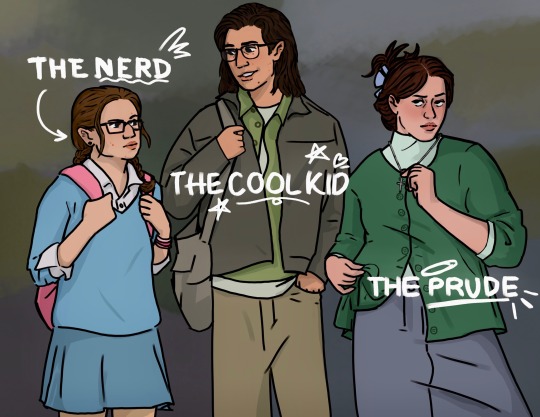
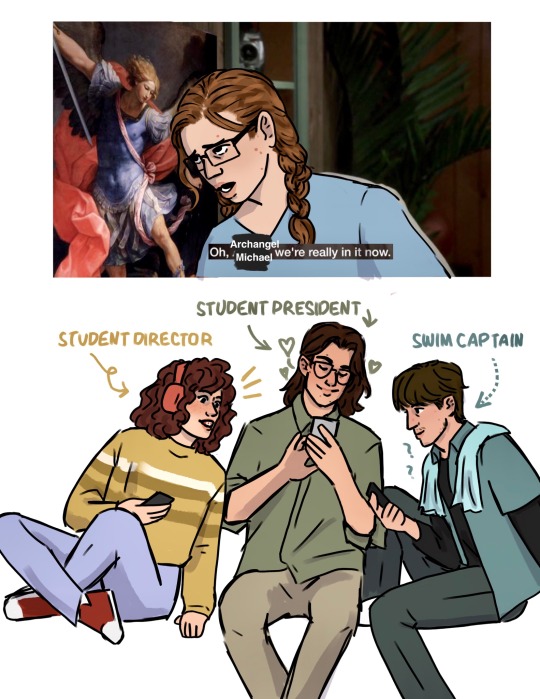
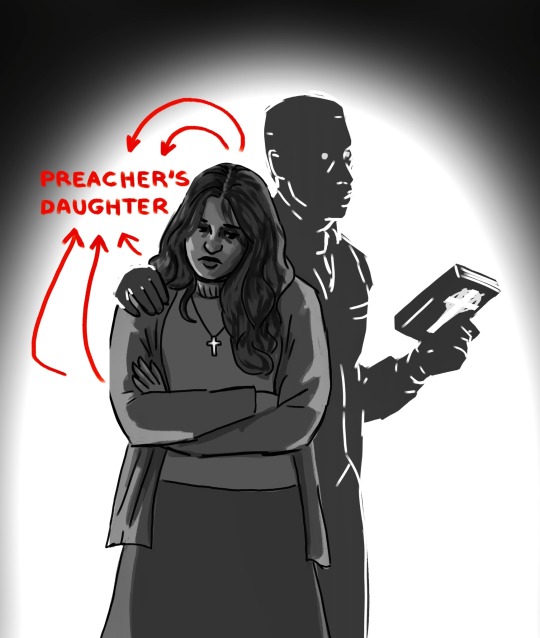
i swear this was just supposed to be some fun aesthetic swap doodles, but then i started thinking about The Implications and now i have a wholeass story behind this au lol
any world where grace chasity isn’t a horny, homicidal prude, we lose the original plot, so this au would revolve more around the church of the starry children then max jägerman lol
solomon decides the best way to wield power in hatchetfield is through religion instead of government and he unites all the tiny denominational churches into his church, becoming the pastor (happening around the same time steph starts middle school.)
it works. almost everyone attends solomon’s church, and it becomes a required social event for anyone who’s anyone in hatchetfield.
but it’s all a manipulation for bigger purposes as solomon slowly incorporates text from the black book, pushing the church into culty territory.
as the preacher’s kid, steph is under constant scrutiny. she might have wanted to rebel as a kid, but the wrath of god is a much bigger threat than just breaking her phone and solomon uses fear and guilt to keep her in line, turning her into a model of godly behavior (at least on the surface).
the chasitys refuse to join solomon’s church, but their small congregation shuts down when there aren’t enough people left.
grace’s parents encourage grace to pour all her free time into individual bible study to make up for the lack of church, church activities, and church outings, but grace starts treating the bible like a textbook instead of a spiritual guide.
without structured church activities, her obsession with rules and procedures shifts to the school system
grace unknowingly separates herself from spirituality when her bible obsession becomes academic. she’s still a christian, but she’s more likely to corner you in the library to infodump about angelic hierarchies than preach about purity.
travis coulson was ruth’s older cousin. it freaked her the hell out that someone could be bullied that bad that they have to transfer and their entire life is erased for a dumbass lie that everyone believes. so ruth vows that she and her friends will never be outcasts (or timberwolves) and drags pete and richie into a "popularity pact" in fifth grade, forcing them to get cool or else.
the trio spends their summer doing research and practicing social skills. (they basically spend their time practicing masking autism and refining their ability to camouflage.)
the trio starts researching what’s cool. their findings? football players, student council presidents, and school play leads are the pinnacle of popularity. so, they throw themselves into middle school tryouts and campaigns to fit these roles:
richie tries out for football but ends up as the mascot.
ruth auditions for the lead in the school play but gets relegated to lighting tech.
pete campaigns for class president but only gets elected secretary.
instead of quitting there, they regroup and try again in high school:
richie uses the athleticism he got as a mascot to land him a spot on the swim team.
ruth works her way up to the the student/assistant director for the school plays
pete works his way up the student council ranks, eventually becoming class president.
the trio is finally just cool enough that their quirks get rebranded as "quirky-cool" instead of "weird." they still bond over star wars and anime in secret, but their popularity ensures they’re never targets again.
#actual plot wise i'm not sure what would go down but i got this background shit figured OUT#i want to tag them as lautskity bc they'd be such an entertaining throuple#nerdy prudes must die#npmd#hatchetfield#starkid#artwork#digital art#my art#lautskity#lautski#stephanie lauter#peter spankoffski#richie lipschitz#ruth fleming#grace chasity
1K notes
·
View notes
Text
How to Get Started with Worldbuilding for Fantasy Writers
Hey fellow writers!
Worldbuilding can feel like a Herculean task, but it’s one of the most rewarding parts of creating a fantasy novel. If you're getting stuck, Here are some tips that have helped me, and I hope they’ll help you too!
Start with the Basics
Geography
- Map out the physical layout of your world. Think about continents, countries, cities, and natural features like mountains, rivers, and forests.
Climate and Ecosystems
- What are the climate zones and ecosystems like? How do they shape the lives of your inhabitants?
Create a History
Origins
- Dive into how your world came into existence. Are there creation myths or ancient civilizations that set the stage?
Major Events
- Outline key historical events. Wars, alliances, discoveries, and disasters can add so much depth.
Develop Cultures and Societies
Cultures
- Craft diverse cultures with unique customs, traditions, and values. What do they wear? What do they eat? How do they express themselves through art?
Social Structure
- Define the social hierarchy. Who holds power? What are the roles of different classes or groups?
Establish Magic and Technology
Magic System
- Set the rules and limitations of magic. Who can use it? How does it work? What are its costs and consequences?
Technology
- Decide on the level of technological advancement. Is your world medieval with swords and castles, or does it have steampunk elements?
Design Political and Economic Systems
Governments
- Create various forms of government. Are there kingdoms, republics, or empires? How do they interact?
Economy
- Define the economic systems. What are the main industries and trade routes? How do people earn a living?
Build Religions and Beliefs
Religions
- Develop religions and belief systems. Who are the gods or deities? What are the rituals and holy sites?
Myths and Legends
- Craft myths and legends that influence the culture and behavior of your characters.
Craft Unique Flora and Fauna
Creatures
- Invent unique creatures that inhabit your world. Consider their habitats, behaviors, and interactions with humans.
Plants
- Design plants with special properties. Are there magical herbs or dangerous plants?
Incorporate Conflict and Tension
Internal Conflicts
- Think about internal conflicts within societies, such as class struggles, political intrigue, or religious disputes.
External Conflicts
- Consider external threats like invading armies, natural disasters, or magical catastrophes.
Use Maps and Visual Aids
Maps
- Create maps to visualize your world. This helps you keep track of locations and distances.
Visual References
- Use images or sketches to inspire and flesh out your world.
Stay Consistent
Consistency
- Keep track of the details to maintain consistency. Use a worldbuilding bible or document to record important information.
Feedback
- Share your world with others and get feedback. Sometimes fresh eyes can spot inconsistencies or offer new ideas.
Let Your Characters Explore
Character Perspective
- Develop your world through the eyes of your characters. How do they interact with their environment? What do they know or believe about their world?
Be Flexible
Adapt and Evolve
- Be open to changing aspects of your world as your story develops. Sometimes the best ideas come during the writing process.
#writer#writing#writer things#writerblr#writerscorner#writing inspiration#writing tips#writers and poets#ao3 writer#author#worldbuilding#sci fi and fantasy#fantasy writer#fantasy#dungeons and dragons#writing inspo#writing resources#writing help#writers community#writing prompt#writer stuff#writing blog#writers on tumblr#writers block#writer problems#writerscommunity
738 notes
·
View notes
Text
The Power of a Name
With @next-pharaoh
The power of a name is something more influential than most people realize. It created an individual, maintained their identity that had been crafted from the womb up until that very point. It interacted with the world around them, choosing their friends, their enemies, their brothers and their lovers. Names decide brains or brawns, cools or fools, the ins and the outs of every living thing. If it was not for names, then who would we even be?
So imagine the power of a name when it is used for the good of a movement, one that has been silently expanding for hundreds of years. While other cultures were fighting wars and attempting to outscore one another, this particular movement stealthily expanded its ranks. Lineage and ancestry can be traced back through countless generations of the male line thanks to this work. Of course, we are speaking of Arabization.
There are obvious reasons as to why this movement is so strong and only has the potential to further dominate. First and most importantly, the Arab-Islamic culture exemplifies masculine ideals, creating stronger men after every new breed. Higher testosterone levels, unbreakable fraternal bonds, governing genetic codes. Their desert-bound history created more aggressive, competitive, and territorial behavior; their strict religious conviction maintain higher levels of confidence and, by right, superiority.
But if this movement is silent, then how are we able to visualize its effects? Consider the following facts: While numbers in almost all historically-dominant religions are dropping, the current Muslim population is predicted to grow more than twice in size by 2060. Islam, and the core values of Arabization along with it, will surpass Christianity as the largest religion in the world in just 25 years.
Reflecting on a local level will help illustrate these details. The branch of mathematics most widely practiced, taught, and respected is algebra, a rhetoric developed into what we use today by Muslim scholars. Arabic speakers have increased by 276% since 1910, with English speakers at 221%, Hindi speakers by 118%, and Mandarin Chinese speakers only by 96% over the same period. The Arabic name Muhammad has risen to become the top-reported baby name in the entire world when all its spellings are counted together, with Amir, Malik, Nasir, and Xavier following close behind.
With all this in mind, how has the Arabization movement utilized the power of a name? How about we make this more personal. Consider the average man, 25 years old, 5’9, and weighs roughly 197 pounds. He is flabby and balding, already considered past his prime at such a young age. Works a meaningless job, lives a meaningless life. His pale skin is a reflection of the blank resume representing his past, present, and future. All this, until a guiding Arab brother calls him by the wrong name.
“Omar!” Omar? But that was not his name. “Omar!” He hears it again, this time from a local. Eventually it seems to resonate with the people around him. At first, this average man was puzzled, but the constant repetition of the name gradually begins to rub softer, washing over his body and smoothing out his ridges. Every "Omar" scrubbed off a piece of his past, better aligning him with a brighter, browner future.
It could start somewhere as vulnerable as porn, the average man filtering through and discarding any videos that do not feature the Arab male. Perhaps his playlists begin to reformat with Arab music, its rhythms and verses constantly playing to further seep into his brain. This restructuring can appear in the home too with a space decorated by Arab imagery, and like a vine it delicately extends further inwards and invades the average man’s very place of rest.
Soon, his interactions with the world around him begin to change. A new Arabic word slips into his everyday language, his connections and role models shift to solely Islamic men, his clothing habits adapt to his beckoning lifestyle. Generic becomes expensive, branded athleisure wear, business becomes religious attire. Each time that new name is uttered, the “Omar” inside inches a little further out.
Eventually, that “Omar” has extended far enough that the results become visibly present. The average man grows taller, broader, his fat stretched against a burgeoning muscular glory. Arms bloat thicker, legs bulge wider. His skin bronzes into a shade of brown that can only be defined as perfection, his hair blackens and thickens across his entire body. The jaw stretches, the nose inflates, the brows and lips protrude. And so too does the average man’s package, its sole purpose to breed future Arabs with its potent seed.
And once "Omar" passes the point of resonation and reaches familiarity, the average man will vanish. The power of a name, his name, Omar, means “long-living, flourishing” in Arabic, his language. And he represents it. An alpha male, an Arab male, a purebred Muslim who understands his mission. So now, Omar takes out his phone and texts a complete stranger, another average man, and simply addresses him as "Ahmed". And the cycle begins once more, the power of a name exploited for the greater good of Arabization.

569 notes
·
View notes
Text
I really don’t understand the criticism that Veilguard doesn’t include enough open, devout Andrastianism. Like, it just perplexes me?
Unlike the first three games, which take place in Southern Thedas (the purview of the Orlesian Chantry, the Sunburst throne), Veilguard takes place almost entirely in Northern Thedas. And it’s clear the Chantry’s role there is very different than in the South.
In Southern Thedas, the Chantry is a power unto itself. The Southern Divine, holder of the Sunburst Throne, occupies a place of real significance and power. She has her own militarized forces (the Templar and Seeker Orders). She politically has to interface with the rulers of the various places in Southern Thedas (Orlais, Ferelden, the Free Marches, etc.), but is not formally associated with or dependent on them. The South is comparatively poorer than the North, and we see a majority of services (taking care of orphans, medical care, the Circles, and very significantly education) being taken care of by the Chantry without necessarily much assistance from the relevant countries.
The Southern Chantry is an ever present figure in Southern Thedas, even for those that aren’t devout. And that is reflected in those stories and the cultures we learn about there.
The Tevinter Imperium is not like that. And that’s not terribly surprising. First, the Imperium pre-dates Andrastianism. They have another, older religion that helped form some of their cultural touchpoints. The Imperium did adopt Andrastianism, but did so as a consolidation of empire (which tracks with the Imperium being, in no small part, a reflection of the real life Roman Empire). As such, the Chantry is folded into and subordinate to the Imperium’s government. The real power in Tevinter, and control over the incidents of daily life that we see the Southern Chantry involved in, is the Magisterium and the Archon.
The Imperial Divine doesn’t control the Templars, the Magisterium and Archon do. He doesn’t control the Circles/education. That’s the Magisterium and Archon again. He is, in practical terms, less powerful than Dorian. He can’t make any real change as the Imperial Divine, so he dons a mask and runs a vigilante group to free slaves and make change that way.
The Northern Chantry simply isn’t as omnipresent as the Southern Chantry in the areas it exists, and it competes with a preexisting cultural backbone in a way the Southern Chantry doesn’t (because it largely stamped that out, though some of the Avvar and Chasind are still around).
I think a lot of people are comparing the impact of Andrastianism in Veilguard to that in Inquisition, because it’s the most recent, and the criticism spawns from that. But that…doesn’t make sense. The Inquisitor is leading a religious organization, ultimately affiliated with the Southern Chantry itself and founded by the left and right hands of the former Divine. It claims its legitimacy from Andraste herself (even if the Inquisitor doesn’t believe a single bit of it). The people who join the Inquisition are all okay enough with Andrastianism to affiliate themselves openly with it (Solas aside, but of course he has other reasons), and many are devout.
The Veilguard are just…random people. Skilled, powerful, talented people, but not people with any real affiliation with any Chantry. Davrin and Bellara have complicated relationships with the Dalish religion they grew up with, for obvious reasons, but they weren’t raised in Andrastianism or an Andrastian culture. Neve, per her, “barely keeps the holidays.” Her relationship to Andrastianism seems closer to the average non-church-attending American who celebrates Christmas and Easter, but isn’t particularly Christian beyond that. Lucanis does seem open to belief in the Maker and Andraste, but is kind of ambivalent to it. More agnostic than anything else. Taash wasn’t raised Andrastian, their mom largely still embraces much of the Qun even if she left, and Rivain was always kind of religiously funky anyway. Only Emmrich and Harding are particularly Andrastian, and even then Emmrich is from Nevarra which although deeply Andrastian is unique. Harding is the only companion whose Andrastianism we’d recognize from the prior games.
So in a game set in a region where Andrastianism is culturally less of an influence, where the Chantry holds far less power, and that has companions that aren’t devout Andrastians…how is it a failure of the game that it isn’t brought up more. That makes sense. It’s consistent with the world building that came before it and the continued reveal of that world in game.
I don’t get it.
384 notes
·
View notes
Text
"Priestess of Isis", "Enchantress" and "Sylph": Occult References in Ellen Hutter’s character in “Nosferatu” (2024)
In another post I analyzed Ellen Hutter’s character in the 2024 adaptation of “Nosferatu” through literary lenses of the Gothic female genre. Now, I want to dwell on her occult and mystical symbolism, and how this translates in her connection with Count Orlok, the undead demon of the story, who’s bound to her. But how and why? And what exactly is she in this story?
“In heathen times you might have been a great priestess of Isis.”
Von Franz tells this to Ellen in their last scene together, because he recognizes her spiritual power and ability to communicate with the spiritual world. Her “hysterical fits” and “epilepsies” also mirror the trance-like states of Pagan priestesses. She inhabits the “borderland”, a peripheral area, a portal between the two worlds: the physical (matter) and the spiritual.

“The pupil is expanded. It does not contract naturally to the light. […] A second sight. She’s no longer here. […] She communes now with another realm.”

“Somnambulists afflicted with these perversions [hysterics and lunatics] oft possess a gift: a sight into the borderland. […] I believe she has always been highly conductive to cosmic forces, uniquely so.”
Von Franz says demons usually obsess over “those whose lower animal functions dominate”, because they like them and seek them out. He elaborates: hysterics and lunatics. However, he says this before he actually gets to know Ellen, and he quickly realizes that’s not the case here. Because Ellen is the one who awoke Orlok from his centuries old sleep. Which is confirmed by three characters in the narrative: Orlok, Ellen herself and Von Franz.
O’er centuries, a loathsome beast I lay within the darkest pit… ‘til you did wake me, enchantress, and stirred me from my grave. You are my affliction.

Which leads me to the next topic:
Why Isis, of all deities?
Isis and Osiris
Isis is one of the major Egyptian deities. She’s more commonly known for her role as “Mother Goddess” of Horus, the Sun god. Isis had mighty magical powers, greater than that of all other gods, she governed the natural world, healing and wield power over Fate itself.
“Destiny!” Ellen cries out to Anna, while looking at the sea. “Providence!” Herr Knock screams throughout the narrative. “You run in vain! You cannot out-run your destiny!” Von Franz laughs in religious fervor as Thomas tries to save Ellen.
Isis is also connected with the themes of death, sex and rebirth in Egyptian cosmology, due to the myth of Isis and Osiris; which are also the core themes of Robert Eggers’ adaptation of “Dracula/Nosferatu”, so it’s not coincidental.
The “Osiris Myth” is one of the major surviving pieces of Egyptian mythology. It’s a ancient tale, with its early versions dating back to the 5th Dynasty (c. 24th century B.C.). It has known several adaptations throughout Egyptian history. The most complete version is in “The Moralia” by the 1st-century scholar Plutarch of Chaeronea, a collection of essays about Greco-Roman culture; that became very popular during the Renaissance era (14-16th centuries) and the Enlightenment period (18th century) in Europe.
Isis and Osiris were brothers, and according to Ancient Egyptian religion, they were in love with one another before they were born, and enjoyed each other in the dark before they came into the world. They eventually married.
Osiris had two facets as a God: in life, he was the God of fertility, agriculture, and vegetation, being considered a “Shepherd God”; in death, he was the God of the Underworld, the judge and Lord of Dead, the afterlife and resurrection. The pharaohs of Ancient Egypt were associated with Osiris in death, because as he rose from the dead, so would they unite with him and gain eternal life through imitative magic. Which appears to be the whole deal between Orlok and Herr Knock in “Nosferatu”, as Knock seeks to gain immortality like Orlok, by serving him.
On Earth, Osiris was believed to take on the form of a bull (the sacred bull Apis). What I find interesting here is that in both the 2016 script and the 2023 script of “Nosferatu”, Orlok’s physicality is actually compared to a bull:
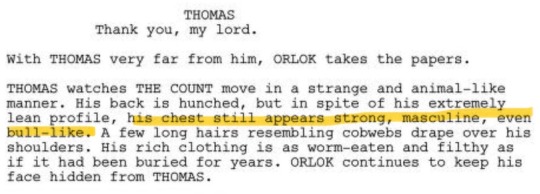

Osiris became king of Egypt, and taught the people how to farm and live peacefully in their villages; he had a reputation for being a powerful and wise king, loved and respected by the Egyptian people. We don’t know exactly how Eggers’ Orlok was in life, other than him being a Romanian or Hungarian nobleman and a Solomonar sorcerer who sought to achieve immortality. But if we go by Vlad III (Drakule or Dracula, the infamous “Vlad the Impaler”) biography, he’s actually considered a Romanian national hero because he defended the Romanian people from foreigner invaders (Germanics and Turks, mostly). Just throwing this out there, because it’s unsure if this is intentional or not.
Osiris and Isis had a brother, Seth (or Typhon in Plutarch essays), the God of deserts, storms, disorder and violence, who murdered Osiris to take his throne. He tricked Osiris into climbing into a wooden chest/coffin, shut the lid, sealed it shut, and threw it down the Nile River, knowing Osiris would never be able to survive. In some versions, it’s said Seth cut Osiris body into pieces and scattered them throughout Egypt. Interestingly enough, there’s a similar legend associated with Vlad the Impaler, who died in battle against the Ottomans, and, according to Leonardo Botta, the Milanese ambassador in Buda(pest), Vlad’s enemies cut his corpse into pieces, too. and his remains were never found.
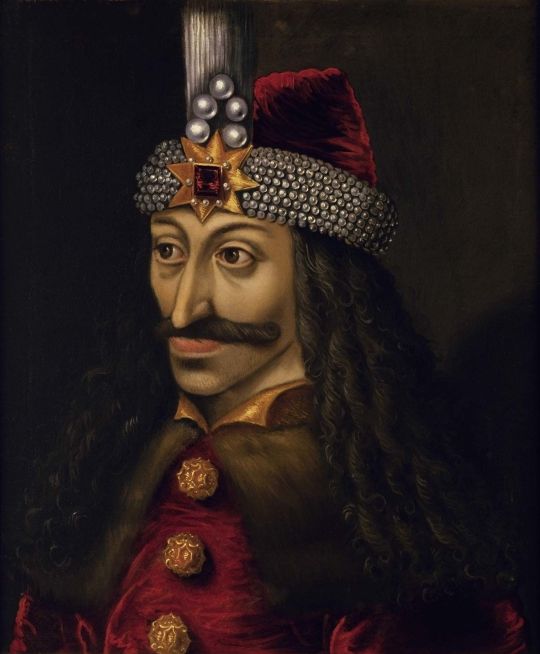
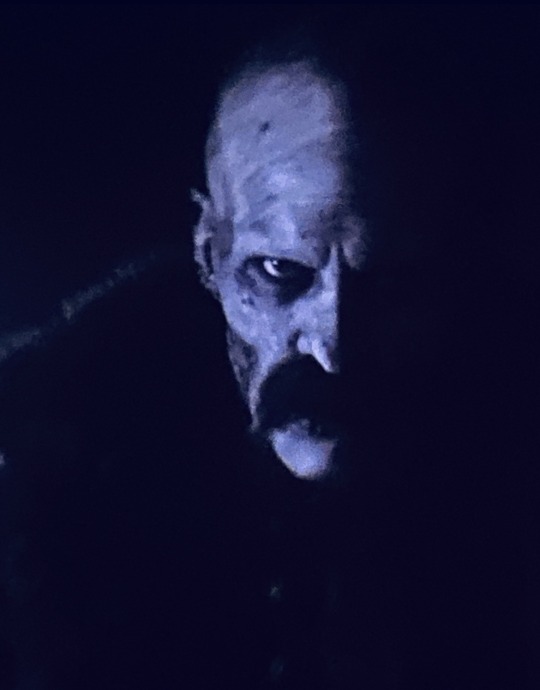
Isis is the epitome of the mourning widow in this myth, as she mourns Osiris’ death deeply. Here enters the symbolism of the lilacs in "Nosferatu", the symbolic flowers of Ellen and Orlok: in the Victorian era, they were associated with widows because they represented a memento of a deceased lover.
Can this also be a nod to “Bram Stoker’s Dracula” (1992) by Francis Ford Coppola? Where Dracula himself is the grieving widower because Elisabeta commits suicide? In the 1992 adaptation, Mina also speaks of “flowers of such frailty and beauty as to be found nowhere else”. What flowers is Mina talking about? It’s unclear, but Lilacs are native flowers to the Balkans, after all.
Isis sought for Osiris’ mangled body and with help of tree other Gods (Nepthys, Thoth and Anubis), they sew Osiris’ body back together, and then wrapped it head to toe in strips of linen, creating a mummy. Interestingly enough, Orlok’s corpse appears almost mummified at the end of the story.

In the Osiris myth, Isis uses powerful magic (incantations and magic spells) to bring her dead lover back to life; similar to Ellen who resurrects Orlok with her summoning prayer. In one version, this happened on a night of the full moon; in “Nosferatu” (2024) we also have a full moon connected to Ellen and Orlok, in the prologue, when he reveals his rotten corpse to her:
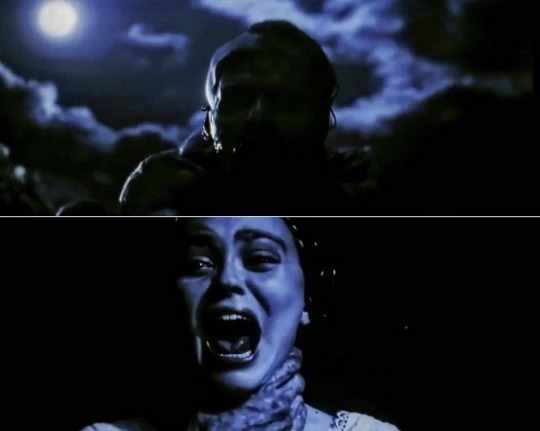
According to Ancient Egyptian funerary texts, it’s Isis sorrow, sexual desire and anger that empower her magic to be able to bring Osiris back to life. When Ellen prays for a companion of “any celestial sphere” in the prologue, she’s crying (sorrow), she’s upset because her father recoils from her now that’s she’s no longer a child (anger) and she’s in her teenage years/puberty (sexual desire). Like Isis with Osiris, it’s the combination of these emotions that power her magic to unconsciously resurrect Orlok.
However, Osiris can’t remain among the living, because he has to return to the Underworld and become King of the Afterlife. But before he goes, Osiris and Isis conceive Horus, the God of the sun and the sky, who will restore peace and order to the universe. In “Nosferatu” (2024), Von Franz says that “with Jove’s holy light” before dawn, redemption will come to the people of Wisburg and the curse of Nosferatu will be vanquished. “Jove” is Jupiter, the “King of the skies”, who’s connected with the Egyptian Horus. Horus and Ra are often merged together in Ancient Egyptian religion, making Isis and Osiris the metaphorical parents of the Sun.

In “Nosferatu” (2024), as Orlok and Ellen complete their covenant, consummate their wedding and he drinks from her, the sun is also the metaphorical result of their union. As dawn breaks, the sunlight vanquishes them both from the physical world, as they both die in the material realm.

After being buried by Isis, Osiris goes into the Underworld to rule over it. And from then on, Isis herself is also associated with funeral rites, as she would guide the souls of the dead, helping them entering the afterlife. Through her magic, Isis helped resurrecting the souls of the dead, as she did with Osiris, acting as a mother to the deceased, providing protection and nourishment.

At the end of "Nosferatu" (2024) we see Ellen fulfilling her role as “priestess of Isis” (or as Isis herself?), as the Goddess of healing, who ends the blood plague in Wisburg, but also guides her dead lover Orlok/Osiris with her into the Underworld... where he'll rule as king? Unclear.
Since we are discussing the Egyptian Gods, I have to mention Greta the Cat, Ellen’s domestic cat. Her name is an obvious homage to Greta Schröder, the actress who played Ellen Hutter in the original 1922 “Nosferatu”. Indeed, cats are predators to rats, however, the Egyptian Goddess Bastet is considered to be Isis’ daughter. She's the "cat goddess" for cats were considered sacred in Ancient Egypt. Bastet was associated with sun gods like Horus and Ra. Bastet was the goddess of pregnancy, childbirh, and protection against contagious diseases and evil spirits.
Enchantress
Orlok calls Ellen “enchantress”, but what does this mean? “Enchantress” is not only a female archetype, but has root in historical realities. Enchantresses were practitioners of feminine magic: oracles, healers, herbalists, midwives and shamanic shapeshifters. They were what’s commonly known as “witches”. These female magicians studied and practiced their art in goddess temples, mystery schools, alchemy schools and hedge schools.
The alchemists of the Middle-ages studied these dynastic lineages of “wise women”, and they had several names: enchantresses, chantresses, encantrices, or incantrix. Many physicians who founded "medicine" and "science" studied these wise women, mainly healers and their use of medicinal plants and herbs.
Ellen’s character appears to fit that of a “incantrix”. Women who used words, incantations, songs, spells and prayers to shape reality. It’s the priestess of an old religion (as Von Franz also calls her); gifted with magic power and authority to command the elements or the body by the power of their word.

Heptagrams
Orlok seal (or sigil) meaning has already been widely discussed by others (symbols of Ancient Dacian religion, mainly the figure of Zalmoxis), but what I want to mention here is the heptagram itself, the seven-pointed star. Heptagrams have several occult meanings, including warding off evil which, for obvious reasons, doesn’t fit Orlok’s character. It has meaning in Alchemy, too, as representative of the seven planets and seven substances.
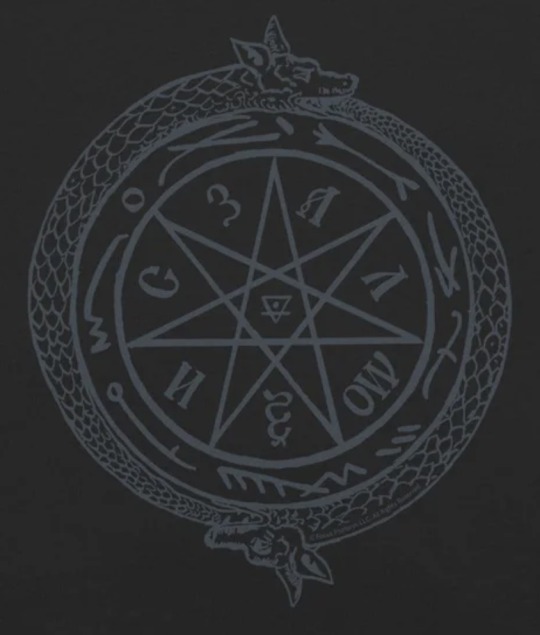
The heptagram, however, is used by Aleister Crowley in his occult system Thelema (from Ancient Egyptian text) to represent a goddess/archetype: Babalon, which is also connected with Isis, Nuit, Lilith, Kali, among other goddesses and deities. At its core, it’s a goddess of female empowerment and liberation, of divine feminine. According to this occult belief, Babalon has several manifestations (sort of incarnation) and is a spiritual gateway to wisdom and enlightenment through chaos and female sexuality.
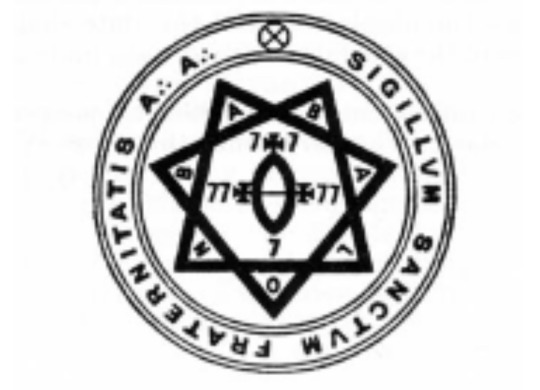
In “Nosferatu” (2024), when Ellen and Thomas are returning home, there’s a man in the streets rambling bits from the “Book of Revelations” (Apocalipse) from the Bible: “And I saw a beast rising out of the sea, owith ten horns and seven heads, with ten diadems on its horns and blasphemous names on its heads.” (Revelations, 13:1).
Indeed this passage is about Orlok arrival and how he’ll spread plague among the town. However, we have a character in the “Book of Revelations” which is connected to all of this: the Whore of Babylon, the “Mother of Prostitutes and All Abominations of the Earth”, and she rides this Beast, which is the same as Crowley’s Babalon. What Crowley did was a positive reinterpretation of this biblical figure, symbolizing liberated female sexuality by embracing the powers of the Divine Harlot.
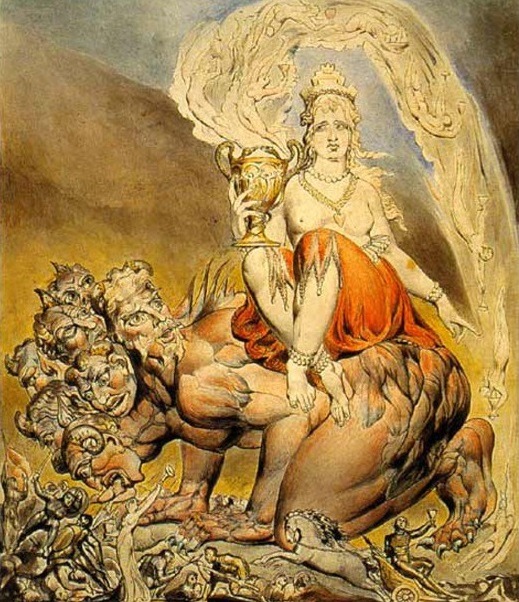
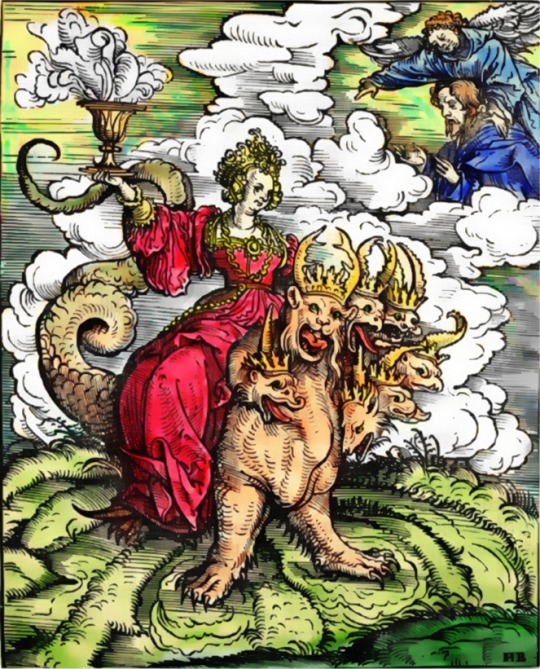
Also known as the “Scarlet Woman” and “Great Mother”, this complex and mysterious figure was established in 1904 in “The Book of Law”, however her roots are far older, and can be found in the Enochian tradition, a magical system by John Dee and Edward Kelly, dated from the late 16th century. In the 2016 script of “Nosferatu”, Orlok spoke Enochian, so it’s clear Robert Eggers is very much aware of all of this.
Initiatrix, Creator and Destroyer, Babalon is the “Great Mother” because she represents matter, Mother Earth. Like Isis, she’s the Archetypical Mother, the Womb, the Great Sea and the Divine Blood itself. According to Crowley, the “whore/harlot” facet is about enjoying sex without the burden of reproduction; and the “mother of abominations” connects with destruction like natural catastrophes, plagues, etc. She’s the ruler of the cosmological sphere and both good and evil (as evil as elemental forces can be or are considered as).
Crowley is a man who was born and raised in the Victorian era where sexuality was to be silenced and repressed, which provides context to his occultist beliefs and his “sex magick” theories. Victorian physicians and scientists were obsessed with classification of sexual perversions, too. “Hysteria” being one example among many. Which is the historical context for Eggers adaptation of “Nosferatu”/“Dracula”, so these references are quite fitting.
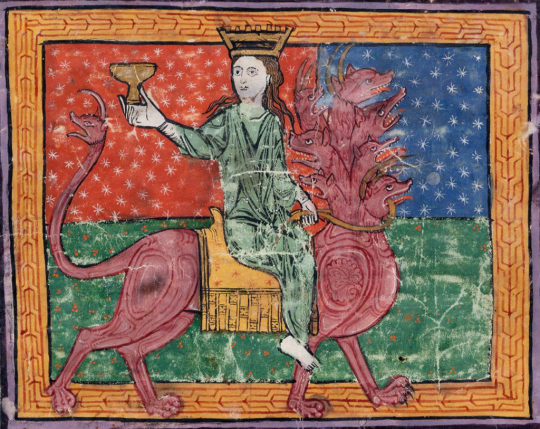
According to the Thelema, Babalon is the “Sacred Whore”, and her primary symbol is the Chalice or Graal (symbolic womb). She’s a consort to the Beast, who has seven heads, which is symbolically represented in her heptagram sigil. Crowley described her: “She rides astride the Beast; in her left hand she holds the reins, representing the passion which unites them. In her right she holds aloft the cup, the Holy Grail aflame with love and death. In this cup are mingled the elements of the sacrament of the Aeon”.
To Crowley these were not actual beings but titles/archetypes (sort of speak) in his Sex Magick beliefs: the “Scarlet Woman” is the High Priestess, and the “Beast” is the Hierophant. This fits Ellen (the priestess) and Orlok (warlock, black sorcerer) in “Nosferatu” (2024). The “Scarlet Woman” is a gateway to both the moon and the sun, and we see both associated with Ellen.
Orlok is described as a “beast” several times in the film, including by himself and by Von Franz, who also mentions Ellen’s “dark bond with beast”, and how she gave her love to the beast: "and lo the maiden fair did offer up her love unto the beast, in close embrace until the first cock crow, her willing sacrifice thus broke the curse and freed them from the plague of Nosferatu."
Orlok says Ellen’s passion is bound to him, like Babalon’s passion is united with the Beast. Babalon as “mother of abominations” also fits with how Ellen unleashed Orlok and his blood plague onto the world, bringing destruction and apocalypse.
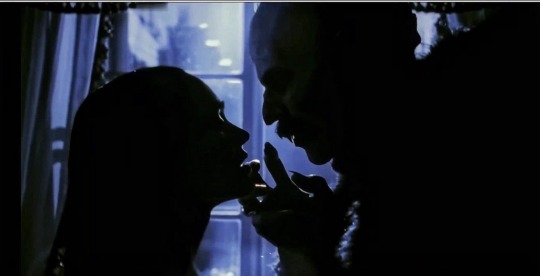
Your passion is bound to me. […] I cannot be sated without you. […] Remember how once we were? A moment. Remember?
Thelemic followers of the Beast have been trying to call into being an older, more primeval, female force that is lacking in the Modern Age. Interestingly enough, this was the reason why Orlok became interested in Ellen in the 2016 script (which was later changed, because in the 2023 version it’s Ellen who summons Orlok): “I have sought a creature from the depths. A Eve that remembers her Eden. You are such one.” Both Crowley but more notoriously Jack Parsons have tried a bunch of incantations to conjure Babalon into being.
Oddly enough, the conjuring ritual we see Herr Knock performing at the beginning of “Nosferatu” (2024) is very similar to one of the incantations of Babalon performed by Jack Parsons: Air dagger, blood and channeling of windstorms and the Air element, over a heptagram. He also compares Ellen to a sylph; a nymph of the air element from alchemy and hermetic literature. We are told by Von Franz this is Solomonari sorcery, but is it really?

In Ophidian Thelema, Babalon is the Goddess of magick (“Heka”), of the Liberation of the Spirit (ecstasy), of the Liminal Point, of the Underworld, of Vengeance and of the Principles of Life. Their priestesses use the female body (vulva and womb) to channel their power during their magic rituals. This is similar to Ellen’s “hysterical fits” when she’s communicating with Orlok in the spiritual world, especially since “hysteria” was considered a disease caused by “wandering womb”. In the film, we also see Ellen's womb being talked about between Von Franz and Dr. Sievers during her examination, when they say her menstruation is liberal and she has too much blood in her.

The “liberation of spirit” is in the form of a Serpent, which manifests in the flesh. This notion was present in the “Book of Law”, where its said there’s the dove, and there’s the serpent, and a choice must be made. While the dove represents religion, the serpent represents the spirit. In one scene, Ellen says Orlok is like a serpent in her body; and he replies it’s not him, but her own nature, a nature she denies. Babalon says “my vocation is the serpent.”
The priestesses of Babalon are also in control of their “trances” when they access the spiritual world. In “Nosferatu” (2024) there’s a interesting scene between Ellen and Thomas (the infamous sex scene), when Ellen “comes back” from her transe when he says he’ll call for Dr. Sievers. Does this indicate Ellen is actually in control of her trance-like states?
Babalon is the guardian of the Seven Principles of the Underworld, a place of darkness and transformation. Orlok tells Ellen in the prologue “you are not for the living. You are not for human kind.” Babalon is also the goddess of the liminal point, who can access other realms. As Goddess of vengeance, Babalon punishes when life is out of balance, and exerts violence and corruption upon those who are in the wrong. Ellen unleashes Orlok onto the world, and we can interpret him bringing plague into Wisburg as Ellen’s reckoning against a society that ostracizes her and will never accept her.

All rites and initiations of the Underworld Goddesses include rites of sex and death. Which is what we see with Ellen at the end of “Nosferatu” (2024). By Thelemic occult tradition, she, the manifestation of Babalon, has sex with the Beast (Orlok), “representing the passion which unites them” and her womb (Holy Grail; cup) is “aflame with love and death” (sexual climax, orgasm, with an un-dead vampire).
I will work the work of wickedness; I will kill my heart; I will be loud and adulterous; I will be covered with jewels and rich garments; I will be shameless before all men; I will, for token thereof, will freely prostitute my body to the lusts of each and every living creature that shall desire it; I claim the Mystery of Mysteries, BABALON the Great, and the Number 156, and the robe of the Woman of Whoredomes and the Cup of Abomination. “The Great Beast: The Life of Aleister Crowley”, John Symonds, 2016

Orlok being the Beast and Ellen the manifestation of Babalon explains why she’s promise to him in the narrative, and was never meant to marry Thomas: in Thelemic tradition, the Beast is the consort of Babalon, after all. Orlok's interest in Ellen isn't predatory for its own sake; he sees her as his rightful and fated spiritual consort, which fits the "bride of Dracula" theme of the Bram Stoker original story.
This probably also mirrors the 1992 adaptation by Francis Ford Coppola, where Van Helsing calls Lucy the “Devil’s concubine”: "Hear me out, young man. Lucy is not a random victim attacked by mere accident. Do you understand? No. She is a willing recruit, a breathless follower, a wanton follower. I dare say, a devoted disciple. She is the devil's concubine! Do you understand me? Yet, we may still save her precious soul." In this adaptation, Lucy is full Crowley and Parsons “Scarlett Woman”, with red garments and red hair.


Orlok also gives Ellen three nights to accept him/her nature and complete their covenant. Some are mistakenly associating this with Jesus Christ. These “three days” are possibly connected with another Goddess associated with Babalon: Inanna (or Ishtar), the ancient Mesopotamian Goddess of love, war, fertility, sensuality and divine law. The most famous myth about this deity is her descent into the Underworld, where she spends three days and three nights dead, until she re-ascends (rebirth).
Ellen also goes through the “Myth of Inanna” in “Nosferatu” (2024), which is the theme of the heroine descending into the “Underworld”, to suffer, to be stripped bare, to die, and to be reborn in the aftermath. This is the primal Shamanic crisis. Ellen also goes through three days and nights of suffering and death (witnessing her friends and the townsfolk of Wisburg dying by the blood plague) until she joins Orlok and is reborn.
Ellen and Orlok are involved in sex magick, at the end, clearly. But with what purpose? Sex magick to Crowley has several purposes and strong creative power, conjuring, invocation, etc. He believed deliberate acts of sexual transgression were a radical form of super-human power that promised to explode the narrow boundaries of Western Christian society and open the way for a whole new era of human history. Which is probably what’s happening here? A symbolic ending to the sexually repressed Victorian era as Western societies moved toward a more open-minded and accepting view of sexuality? Or it’s Ellen reborn as a Goddess of the Underworld (return to spiritual state), after going through a initiation rite of sex and death, as she breaks free from her human form? Or both?
Or it can be a nod to Crowley idea of sex magick to unleash supreme creative power to generate a godlike child? This can mirror the Osiris and Isis myth, of Horus (the Sun) as their metaphorical child, like it is for Ellen and Orlok here, as the end result of their union.
Alchemy
Alchemy, at its core, is the transmutation of base materials (lead, etc.) into noble materials (gold), and the pursuit of immortality (“philosopher’s stone”). Occultists reinterpreted this as a spiritual quest of self-transformation, purification and regeneration of the human soul. Hence physical death being seen as a gateway to another life (rebirth); which is the symbolism of the final scene of “Nosferatu” (2024).

Both Ellen and Orlok evolve from a diseased and corruptive state (physical world) into regenerative and perfect state (spiritual world), after being purified by fire (the Sun). Their old selves are empty shells, as their spirits ascend. This also finds parallel in the myth of Isis and Osiris, as they both went from “daemons” to Gods in the Plutarch essay.
And this also finds parallel in the 1992 adaptation when Vlad/Dracula ascends to the Heavens and is reunited with Elisabeta’s soul. Is this intentional? Are we dealing with reincarnation themes in Eggers' adaptation, as well? According to occultists both Babalon and the Beast have had many manifestations (reincarnations) in the physical world throughout the centuries, after all.

Orlok asking Ellen to remember their shared past, is also an interesting nod to Vlad and Mina in the Coppola's adaptation (their OST is called "Love Remembered"): "I have crossed oceans of time to find you." and “I have sought a creature from the depths. A Eve that remembers her Eden. You are such one.” in the 2016 "Nosferatu" script. Which didn't change all that much in 2023, except we don't have an actual explanation for Orlok interest in Ellen, other than her waking him from his centuries old sleep (resurrection).
#nosferatu 2024#robert eggers#ellen hutter#count orlok#lily rose depp#bill skargard#von franz#dr sievers#ellen x orlok#orlok x ellen
234 notes
·
View notes
Video
youtube
Why Trump Is Partnering With Christian Nationalists
Donald Trump is portraying himself as a religious savior. He says Election Day will be: …”the most important day in the history of our country, and it’s going to be Christian Visibility Day.”
Trump has repeatedly compared his criminal trials to the crucifixion of Jesus, promoted videos calling his reelection “the most important moment in human history,” and that describe him as a divinely appointed ruler.
He claims to be a holy warrior against an imaginary attack on Christianity.
TRUMP: They want to tear down crosses//But no one will be touching the cross of Christ under the Trump administration. I swear to you.
He’s even selling his own version of the Bible.
Trump is playing to a rising white Christian Nationalist movement within the Republican Party.
Christian Nationalists believe that the law of the land is not the Constitution, but instead the law of God as they interpret it. Under this view, atheists and people of other faiths (including Christians of other denominations) are all second-class citizens.
Trump’s supporters are increasingly overt in their calls to replace democracy with a MAGA theocracy.
The idea that the will of voters is irrelevant because God has anointed Trump was a recurring message in the efforts to overturn the 2020 election.
In previous videos, I’ve highlighted how MAGA Republicans have embraced core elements of fascism. They reject democracy, stoke fear of immigrants and minorities, embrace a gender and ethnic hierarchy, and look to a strongman to lead and defend them.
The combination of fascism and Christian Nationalism is called Christofascism, a term first used half a century ago by the theologian Dorothee Sölle. Fascists rise to power by characterizing their opponents as subhuman. Christofascists take it a step further by casting opponents as not just subhuman, but actually demonic.
Framing opponents as enemies of God makes violence against them not only seem justifiable, but divinely sanctioned, and almost inevitable.
Christofascists want to strip away a wide range of rights Americans take for granted. Former Trump staffers involved in developing plans for a second Trump term have called for imposing “Biblical” tests on immigration, overturning marriage equality, and restricting contraception.
And MAGA-aligned judges are already setting their dogma ahead of the Constitution. In his concurring opinion on the case that declared frozen embryos are people, Alabama Supreme Court Justice Tom Parker cited God more than forty times and quoted the Book of Genesis and other religious texts.
Nothing could be more un-American than the Christian Nationalist vision. So many of America’s founders came here as refugees seeking religious freedom. The framers of the Constitution were adamant that religion had no role in our government. The words “God,” “Jesus,” and “Christ,” don’t appear anywhere in the Constitution. And the very first words of the Bill of Rights are a promise that “Congress shall make no law respecting an establishment of religion, or prohibiting the free exercise thereof.”
Christofascism, or any religion-based form of government, is a rejection of everything America has aspired to be — a secular, multi-racial society whose inhabitants have come from everywhere, bound together by a faith in equal opportunity, democracy, and the rule of law.
Beware.
503 notes
·
View notes
Note
what is Midst about?
Oh, this is a QUESTION.
Midst is space fantasy New Weird about three people whose lives are disrupted when The Trust, a society based around quantifying the value of good and bad deeds, takes interest in the planet-like islet of Midst.
Midst is about how the moon will explode and the government will spend more time talking about how bad this is for the economy than organizing disaster relief.
Midst is about what happens if The Good Place point system was an economic policy.
Midst is about a cult expanding its sphere of influence and its attempts to maintain hold on a cast of new converts, increasingly disillusioned devotees, and escaped apostates.
Midst is about the mechanics of blame, guilt, fault, accountability, and culpability and how emphasizing sole individual responsibility (for good and bad) deflects from the role of institutions, structures, environments, cycles, and ideologies in perpetuating harm.
Midst is about trying to balance the metaphorical books by making them very much not-metaphorical and how understanding that you can never (figuratively) zero out in reality shapes the way different people face or run from what they've done, hope for redemption and absolution (or not), and relate to themselves and others.
Midst is about taking the phrase capitalism as religion literally.
Midst is about a murder case in a frontier town that swiftly escalates into a major public scandal that reaches into the highest ranks of the federal capital and threatens to destabilize its most prominent institutions.
I promise none of these are exaggerations in the slightest.
#Midst#Midst podcast#Midst things#edit: I wrote this between S2 and S3 and now I'd reword some to be more accurate to theme but I retain it as it was for historical reasons#it's only slightly off at least#Midst Cosmos
735 notes
·
View notes
Text
So you want leftist candidates? Here's how you get them:
First off, you have to understand that the far right didn't just wake up one day and say, "We should fuck up the country!" They have been OPENLY working for decades to fill literally every elected or appointed government position they could with Christian Dominionists and other right-wingers, and these folks show up to the polls EVERY SINGLE TIME.
When I was a kid in a far right church in the 1960s, they openly discussed how important is was to get their people into office who would help pass legislation to persecute/imprison/kill anyone who didn't follow their religion. If there's no one sufficiently right-wing running, they'll vote for whomever is closest, even if it gags them. And I cannot emphasize enough that they have long term goals that they are willing to take--and HAVE taken--generations to achieve.
The overturning of Roe v. Wade, for example, is a DIRECT RESULT of the decades-long effort by the far right to boost the most far-right-leaning candidates they could find. They've been talking for decades SPECIFICALLY about getting enough far right judges in SCOTUS to overturn Roe v. Wade. And these SCOTUS appointments are for LIFE, so these judges get to set policy for your GRANDCHILDREN.
So yes, the overturning of Roe v. Wade was only made possible because Trump was able to appoint three SCOTUS judges, in addition to all the other federal judges he appointed. Amd they're talking about going after same-sex marriage, minority rights, etc.
(Hell, the judge in charge of his secret documents case is one that he appointed--she has indefinitely postponed that case,by the way.)
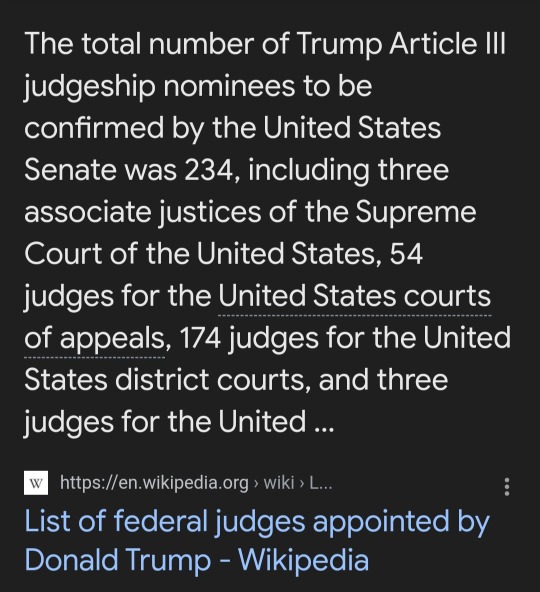
And you don't think local school board elections are important? Have you not seen the news about all the anti-queer policies, and all the book-bannings? This, also, has a generational effect.
Meanwhile the left refuses to turn up to the polls because none of the candidates are pure enough. So guess why things are getting worse?
If the Left turned out for the most left-leaning candidate at EVERY SINGLE ELECTION, whether local or state or whatever, including primaries, we'd start seeing more leftist candidates. Yes, that means that if there's a choice between two extreme right wing candidates, you vote for the least extreme one.
I know I keep emphasizing that this is not just about POTUS, but POTUS does figure in, of course (among other things, who do you think appoints judges for congress to approve?).
So swallow this pill: Anything shitty Biden is doing, the shitgibbon will do MORE of.
"Not gonna vote Biden because he supports genocide, so I'd rather the guy win who ALSO supports genocide, wants Russia to invade more countries, thinks it's fine if China retakes Taiwan, wants a nationwide abortion ban, removal of civil rights for minorities, wants to overturn same-sex marriage (which the right-leaning majority in SCOTUS are already talking about), to cut back the role of congress in checking executive actions (including workarounds to avoid the need for congressional confirmation for presidential appointees), to remove federal employee protections so federal personnel can be replaced with Trump loyalists, and so on! That'll teach those Dems a lesson! THEN they'll be sorry. And fuck everyone the bad guys hurt, because I'll still be PURE. So what if top GOP officials want to actually NUKE Gaza?"
That's fucking kindergartner thinking.
Yes, Biden is a piece of shit, but I am not waxing at all hyperbolic when I say that a second orange shitgibbon term, with a far-right-majority SCOTUS--especially if the GOP manages majorities in both houses of congress--may be the end of what little is left of Democracy in the US. Not gonna argue about it, because I don't waste my time with petulant children.
Look at the GOP's plans for a Republican administration, and tell me you think it sounds better than another term of Biden. Hell, they've even set up online trainings and loyalty tests to narrow down potential federal hires to those who will commit to follow Trump without question.
I repeat: If you want more leftist candidates, if you want more worker power, if you want billionaires taxed, if you want to protect minorities and the queer community, you have to adopt the strategy that the right has used, educate yourself about what candidates stand for, and show up EVERY SINGLE TIME. Again, that includes primaries.
So many of us on the left would rather sit in the basement dreaming of some magical revolution that's going to fix everything, giving ourselves and others purity tests, and proudly announcing that we're... boycotting democracy by not voting(?), "because none of the candidates are a good choice."
Yeah, the left refusing to vote--or only voting in presidential elections--while the right turns up every time is exactly how we got here.
And you have to support the most left-leaning candidate even if it makes you gag, and even if "most left-leaning" means "not as openly fascist." This is the ONLY way you can be assured of candidates getting further to the left in the future. (Note that this means learning about your local candidates.)
"But voting won't fix--" I never said it was going to fix everything. There's no rule that if you vote, you can't volunteer with Food Not Bombs, or run for school board, or demonstrate, or circulate petitions. It takes more than voting, but voting has to be PART of our strategy.
You also have to accept that it may take decades to change course, and that you're not going to like every candidate you have to vote for.
The right didn't just magically get the orange shitgibbon into office overnight. It took decades of work. And if we want decent human beings in charge, we have to be willing to do the same.
462 notes
·
View notes
Text
Opinion | Lessons from Alexandria: A Cautionary Tale for Modern American Politics
By Jet Espinosa In a city once hailed as a beacon of knowledge and tolerance, Alexandria drew people from across the ancient world. It was a place where scholars, thinkers, and believers from diverse backgrounds came to share and preserve their wisdom. With libraries that housed invaluable knowledge in science, philosophy, medicine, and the arts, Alexandria was a symbol of progress and…

View On WordPress
#Alexandria library destruction#American democracy#Ancient Alexandria#Cultural diversity#Enlightenment and progress#Freedom of belief#Historical cautionary tales#History repeating itself#Intellectual freedom#Knowledge and tolerance#Lessons from ancient civilizations#Lessons from history#Modern American politics#Political power and religion#Politics and religion#Protecting democracy#Religious influence in politics#Religious tolerance#Role of religion in government#Separation of church and state
0 notes
Text

There are some on the right, the pro-fascist side, who would claim Dems, liberals are the establishment.
First I would like to start out with the definition of liberal. Liberal: Willing to listen to, or accept ideas and opinions different from one’s own. Open minded.
Now let’s take a loo at conservative. Conservative: Adverse to change or innovation. Holding to “traditional” values.
When one thinks of movements that have bettered humanity, and the world at large are these done in the name of tradition? Are these done by the ideals of old?
Tradition in this country can be rooted back to slavery, back to a time when white people lorded their superiority over others based solely on the color of their skin. It can be traced back to the most wealthy among us, exploiting workers to enrich themselves with as much as possible while no care is given for the health and safety of those who make their wealth possible. Tradition can be traced back to voter suppression and Jim Crow laws, disenfranchising the votes of those who don’t fit their socioeconomic standards, who don’t fit their color code.
This tradition can be traced back to TODAY! Because this tradition of disenfranchisement is happening TODAY! Nearly every state with a GOP majority has done, and is doing all it can to drop voters off the roles. Pretending there’s some kind of fraud. This fraud is simply the poor, those of color, and those who don’t fit a white Christian mold, that they seem to think this country is.
Through years of scheming and planning, through a lack of foresight from our founding fathers, trying to appease slave states. The GOP has found a way of minority rule over the vastly diverse country America is. This minoritarian rule can be seen clearly in SCOTUS, it can be seen in the senate where millions and millions of Americans have little to no say on the goings on in government. Wyoming, North Dakota, South Dakota, Montana, Idaho, all those states combined don’t have the number of citizens California does. All those states are “conservative” states, but California gets 2 representatives, the collective there is 10! A 10-2 vote with not nearly as many constituents. There’s the house though!? Some may argue. The house is a joke! So gerrymandered, useless idiots like Margery toilet Greene will keep her seat for decades to come. We outnumber conservatives in the real world but are trampled by them in representation.
We are the revolutionaries! We are the fight against the forces of old and evil! We are the fight for change! For a better America, for a better world where ALL have equal rights! Where ALL get the same shot at the American dream! Where ALL are treated as members of this country despite their origins or preferences or religion! We are the rebellion against “tradition”. A tradition that seeks to benefit one sect of peoples. We are the other sect and we will not be gaslit to think otherwise.
All of us in the pro-democracy movement are the heart of this nation. The liberals who will take the pinnacle of diversity and thrive with the ideas of all! We are the change. We are the next generation. We are love! We are hope! We are the open minded, accepting, tolerant, compassionate, ever learning, ever growing liberals of the United States of America.
#election 2024#politics#vote blue#kamala harris#news#traitor trump#donald trump#republicans#the left#gop#free speech#freedom#fascisim#trump is a threat to democracy#declaration of independence#democrats#democracy#harris waltz#harris walz 2024#pearl harbor#trump24#fuck trump#trump is a traitor#kamala for president#kamala 2024#vote kamala#american people#liberals#the statue of liberty#liberty
206 notes
·
View notes
Note
I think we should talk about Wu Zetian, China’s only female emperor, who historically has been regarded as a horrible and brutal leader.
She was born a commoner, became a concubine to one emperor, married his son and then took the role of emperor for herself when he died. She was politically adept, highly ambitious and extraordinarily intelligent.
History has accused her of smothering her newly born daughter and blaming a rival for her death. She had that rivals hands and feet cut off and then had her thrown into a vat of wine in which she was left to drown. She gouged out another rivals eyes and had acid poured down her throat. She wiped out 12 entire branches of a clan. She poisoned her mother. Just how accurate these things are is up for debate, but while these things might not all be true, she certainly did have several family members killed. And she did deal with her rivals and her detractors ruthlessly. Yet none of these things would have attracted criticism if she had been a man. She was no more scandalous than any other ruler during that time period.
But! Her rule was peaceful and prosperous. She avoided wars and welcomed ambassadors from as far away as the Byzantine empire. She changed laws so common people could be chosen for roles in government for their abilities rather than their name or status. She acknowledged and acted on criticisms from her retainers. She built watchtowers along the Silk Road so merchants wouldn’t be harrowed by bandits. Her reign saw women given more freedom(the ability to divorce, hold government positions, travel, hunt and ride horses, to be recognized by scholars).
She supported Buddhism and helped the religion spread and grow through commissioning temples, monasteries, and even a statue of the Buddha said to be carved in her own likeness. In the eyes of the common people, she likely would have been an incredibly popular ruler.
She remains a controversial figure primarily because of stories about her personal actions against her rivals by male Confucian officials who were prejudiced against strong and ambitious women and while they undoubtedly exaggerated aspects of Wu’s life, there is still substantial verifiable evidence of her ruthlessness.
We should also be aware that although she allegedly held her power through murder and merciless, according to Confucian philosophy, ‘while an emperor should not be condemned for acts that would be crimes in a subject, he should be judged harshly for allowing the state to fall into anarchy’ and viewed under this lens, Wu did effectively fulfill her duties as a ruler.
So we have a leader of ancient china who had two faces, one who committed acts of vile cruelty against her family and rivals and one who gave her citizens peace and prosperity.
Through a modern lens she can be viewed as an evil woman who rose from humble beginnings and coldly and calculatingly murdered her way into arguably the most powerful position in the world. A rich woman who threw crumbs to her peasant people while she lived luxuriously. She is a deadly woman, a black widow, an evil stepmother, a kinslayer. But according to historians, “without Wu there would have been no long enduring Tang dynasty and perhaps no lasting unity of China.”
The comparison to a modern mr beast obviously doesn’t hold water, but we can certainly analyze jgy to a more comparable historical figure and argue more accurately in a historical context if jgy was a good leader as the de facto emperor as the cultivation worlds Xiāndū.
It’s easy to see the comparisons between Wu and jgy, both were undesirable and deemed unfit by society. But both were politically adept, highly ambitious and extraordinarily intelligent. Both had family members murdered, perhaps sharing between them filicide. Both had a clans murdered to a man. Both are thought to have had their faces carved on religious relics for their narcissistic pleasure. Both had watchtowers built as a defense for their people. And both were torn down by the men following after them, vilified and distorted. Both forever destined to be speculated upon and misunderstood. Both of their legacy’s destroyed by rumor and falsification. It would not surprise me in the slightest if mxtx didn’t draw on Wu at least a little bit in the creation of jgy. Both Wu and jgy are culpable for some pretty heinous stuff, that can’t be denied. But like Wu, jgy also has a second face.
Moral bias and character motivation aside, his efforts to build watchtowers, his patronage of religion in the building of Guanyin temple, his fight against political corruption, his years long peaceful reign, his charity, all these things lead to the conclusion that under the rule of Confucian, he more than aptly fulfilled his role as a leader for his citizens.
And if you really want to look at Jgys leadership through a modern lens, we really don’t have to look much further than Ingersoll. “If you want to find out what a man is to the bottom, give him power.”
And really that’s part of the tragedy of his character. Because of his background he excelled when he was in a role of leadership. He was good at it.
Whether or not jgy as a literary character is a good person, is subjective and should not be used to measure his role as an effective leader.
All of that being said, jgy is my bestfriend and I love him and would I die for him.
.
239 notes
·
View notes
Text
Writing Notes: Dystopian World

The Physical World
What is the landscape of your world?
What is the climate of your world?
What do people (if applicable) look like?
What do animals (if applicable) look like?
What types of clothes do people wear?
What do houses or living quarters look like?
When does your story take place?
Where? On the earth we know, a distant planet, or an alternate reality?
Culture and Society
What are some commonly held beliefs in this society?
What type of government do they have?
Who is in power?
How did they become powerful?
How intrusive is government in daily lives?
What form of propaganda is used (if any)?
What is the history of this society?
What is the society’s biggest fear?
What is the society’s most positive feature?
What are the values of this society?
What are the social classes?
Why are there social classes?
What is the ethnic diversity, if any?
What are the gender roles?
What, if any, religion do they practice?
What language do they speak?
Is the entire world affected and how?
How do people get food?
Is there money? What type?
Character Development
Is your character alone?
Why is he alone?
Does your character have friends?
What motivates your character?
How do the characters interact with the dystopian society?
How do they interact with each other?
Source ⚜ Writing Notes & References
#writing notes#dystopian#writeblr#writing reference#on writing#writing tips#writing advice#worldbuilding#character building#template#literature#writers on tumblr#dark academia#spilled ink#poets on tumblr#writing prompt#poetry#fiction#creative writing#light academia#felix vallotton#writing resources
249 notes
·
View notes
Text
14 Characteristics of Fascism by Lawrence Britt
Powerful and Continuing Nationalism Fascist regimes tend to make constant use of patriotic mottos, slogans, symbols, songs, and other paraphernalia. Flags are seen everywhere, as are flag symbols on clothing and in public displays.
Disdain for the Recognition of Human Rights Because of fear of enemies and the need for security, the people in fascist regimes are persuaded that human rights can be ignored in certain cases because of "need." The people tend to look the other way or even approve of torture, summary executions, assassinations, long incarcerations of prisoners, etc.
Identification of Enemies/Scapegoats as a Unifying Cause The people are rallied into a unifying patriotic frenzy over the need to eliminate a perceived common threat or foe: racial , ethnic or religious minorities; liberals; communists; socialists, terrorists, etc.
Supremacy of the Military Even when there are widespread domestic problems, the military is given a disproportionate amount of government funding, and the domestic agenda is neglected. Soldiers and military service are glamorized.
Rampant Sexism The governments of fascist nations tend to be almost exclusively male-dominated. Under fascist regimes, traditional gender roles are made more rigid. Opposition to abortion is high, as is homophobia and anti-gay legislation and national policy.
Controlled Mass Media Sometimes to media is directly controlled by the government, but in other cases, the media is indirectly controlled by government regulation, or sympathetic media spokespeople and executives. Censorship, especially in war time, is very common.
Obsession with National Security Fear is used as a motivational tool by the government over the masses.
Religion and Government are Intertwined Governments in fascist nations tend to use the most common religion in the nation as a tool to manipulate public opinion. Religious rhetoric and terminology is common from government leaders, even when the major tenets of the religion are diametrically opposed to the government's policies or actions.
Corporate Power is Protected The industrial and business aristocracy of a fascist nation often are the ones who put the government leaders into power, creating a mutually beneficial business/government relationship and power elite.
Labor Power is Suppressed Because the organizing power of labor is the only real threat to a fascist government, labor unions are either eliminated entirely, or are severely suppressed .
Disdain for Intellectuals and the Arts Fascist nations tend to promote and tolerate open hostility to higher education, and academia. It is not uncommon for professors and other academics to be censored or even arrested. Free expression in the arts is openly attacked, and governments often refuse to fund the arts.
Obsession with Crime and Punishment Under fascist regimes, the police are given almost limitless power to enforce laws. The people are often willing to overlook police abuses and even forego civil liberties in the name of patriotism. There is often a national police force with virtually unlimited power in fascist nations.
Rampant Cronyism and Corruption Fascist regimes almost always are governed by groups of friends and associates who appoint each other to government positions and use governmental power and authority to protect their friends from accountability. It is not uncommon in fascist regimes for national resources and even treasures to be appropriated or even outright stolen by government leaders.
Fraudulent Elections Sometimes elections in fascist nations are a complete sham. Other times elections are manipulated by smear campaigns against or even assassination of opposition candidates, use of legislation to control voting numbers or political district boundaries, and manipulation of the media. Fascist nations also typically use their judiciaries to manipulate or control elections.
106 notes
·
View notes